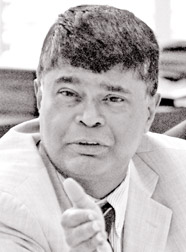Reform and reconciliation in Sri Lanka
Text of the speech by Prof Rajiva Wijesinha,
MP at the Australian National University, Canberra held on May 23, 2011.
Continued from yesterday
 |
|
Prof Rajiva
Wijesinha,MP |
But, apart from fulfilling these pledges which our ministry managed
to advance significantly even during the conflict period, it is also
imperative that government puts in place better communication
strategies, in particular to convey information to, and respond to the
concerns of, those who are not intrinsically supportive of government.
Much energy is expended on communicating with those who are appreciative
of what is being done, and this is important since no government should
neglect those from whom it derives its strength. But it is more
important to communicate also with those who have doubts, and in this
area government has much to do.
Child soldiers
Distinguished academics, including Australians, who have actually
studied the situation on the ground have told us that we have a good
story to tell, but we have not told it. After all, where else have
nearly all the displaced been resettled so soon? This includes not only
the near 300,000 displaced during the last few months of the conflict,
but the larger numbers who had previously been displaced, those in the
East being largely resettled within a year of displacement, those who
had been displaced for upto two decades being also able now to return
home if they wish, including the Muslims expelled from the North in 1990
by the LTTE.
The child soldiers who were finally rescued, after years of
ineffective efforts to stop this ghastly practice of the LTTE, were
given schooling in one of the best schools in Colombo. Orphans have been
looked after in established as well as newly constructed institutions,
as also by schools that have taken on the challenge successfully - in
which regard I should note that support for such schools would always be
welcome, along with support to educational institutions in the North
that would like to expand the services they provide, to take in more of
the Wanni too.
Infrastructure has been developed apace, and the East indeed has been
transformed in the last couple of years with communications having
opened the way to much more trade. More work in this regard remains to
be done in the North but, with the rebuilding of roads and the railway,
there will be greater exchange of persons as well as of goods. In this
regard support for increasing exchanges between young persons would also
be welcome.
Hostile approach
I was pleased that one of the Australian journalists who interviewed
me, having begun with what seemed a hostile approach, said at the end
that there were many matters which were not known here. In one sense
that is understandable, because the media obviously prefers bad news to
good, since that is what people are interested in. But I believe it is
also our fault that we have not communicated better, not only to the
media, but also to all those who want a better Sri Lanka for all our
people.
As I said at the beginning, I can understand why so many people left
our shores, not only for economic reasons in the seventies, but more
worryingly for what I can only describe as the disgusting attacks on
Tamils in the early eighties, the burning of the Jaffna Public Library
in 1981, the systematic assaults of July 1983. Those have not been
repeated, but I can understand that, in the confrontational approach
those brutalities engendered, heightened by the refusal of the LTTE to
accept in 1987 the compromises that all other Tamil groups subscribed
to, tensions continued.
But, now that these have concluded within Sri Lanka, I hope that
those abroad, who can remember only the distant past, will not endeavour
to revive tensions. The people of Sri Lanka, all over the country, but
in particular those in the North, suffered from terrorism, from forced
conscription of children, from execution for dissent, from deprivation
of services including the food we sent up to them.
UN and ICRC
Though the ICRC recorded its appreciation of the support our Navy
extended with regard to evacuation, it should be noted that of the near
14,000 people brought down during the conflict, only 4,500 were wounded.
There were a couple of thousands who were sick, while over 7,000 were
described by the ICRC as bystanders. If the claims the LTTE made as to
injured were accurate, it would seem that they did not send down some of
the wounded for medical assistance, but instead sent down their chosen
bystanders to safety. It is likely that they were in fact lying about
the number of those wounded, which would in turn mean that they had not
just exaggerated, but grossly exaggerated, the number of those dead.
But, given the way they treated the people of the Wanni, it is also
possible that they deprived them of medical assistance and instead sent
down their cadres to the relative safety of the south of Sri Lanka. Such
matters need to be carefully considered, with precise attention to the
statistics maintained by various agencies, international as well as
national. That will help in making clear the generally humane way in
which government operated, as is evident from the written appreciations
sent by the heads of both the UN and the ICRC.
We need to do this soon, so that those who are genuinely concerned
about the Tamil people in Sri Lanka will be able to understand what they
went through, and help to recompense them for what they suffered in a
militarized situation. But above all we need to make it clear that the
participation of all our citizens, including those now settled abroad,
will prove invaluable in the reconciliation, the rehabilitation and the
rebuilding that we need swiftly to achieve. Concluded
|



